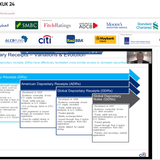On Sunday 367 of 513 Deputies voted to go ahead with impeachment proceedings, more than the two-thirds of votes needed in the lower house to initiate a vote in Brazil’s Senate, where a simple majority is needed to approve a motion to try Rousseff. If the motion passes the Senate, she will be temporarily removed from office while she is investigated.
Brazil’s president is currently being accused of using accounting trickery to mask the true size of the country’s deficit. If the motion passes the Senate, Vice President Michel Temer would take on the presidential duties and the Senate would have 180 days to conduct a trial against Rousseff, who has two opportunities appeal a decision.
Rousseff has repeatedly described moves to impeach her as an attempted “coup” by the opposition.
Currencies, equities and bonds all reacted with a brief – albeit mixed – flutter. The Brazilian real ended trading Friday at 3.551 to the USD, rising temporarily at the start of Monday to 3.516 per USD before falling back even further to 3.593 per USD.
The iShares MSCI Brazil Capped ETF, which is exposed to large and mid-sized companies in Brazil, rose 3% before dropping back slightly 0.22% on Monday. Spreads on Brazil’s 10-year government bonds also narrowed Sunday following the results of the impeachment vote, but widened again by 17bps on Monday.
Some are looking at recent gains in the BRL as an opportunity to generate fresh returns in currency markets, at least in the short term.
“The BRL should extend its rally on political momentum, but the BCB’s reverse FX swap auctions should limit the pace of the rally. Poor macro-fundamentals will likely remain the major currency driver, and we believe that the rally will create opportunities to sell the BRL,” explained Amit Agarwal, an analyst at Societe Generale in a recently published research note.
“The short end of the BRL curve is pricing a 120bp rate cut by year-end, and the rates rally might extend in the near term. Given the steep rally, we look for paying opportunities on a risk-reward basis.”
Brazil was among the worst performing emerging markets of 2015. But so far this year markets have seen a 28% rally in Brazil’s local-currency bonds and a 22.79% jump in the Ibovespa stock market index, according to Bloomberg.
Analysts and observers believe the final result of the vote was more or less in line with expectations, contrary to more optimistic views that the opposition could get closer to 380 votes, one of the reasons markets will have to wait for new developments until pricing shifts more favourably.
“PT and the government is signalling its reaction, not only in terms of the likelihood Rousseff would appeal to the Supreme Court. It could stir up more social conflict,” said Zeina Latif, chief economist at Brazilian investment house XPI.
Besides a final outcome to Rousseff’s impeachment proceedings, Latif said the market will have to wait for more substantial changes to take place, which includes waiting for fresh signals on the country’s economic agenda and new structural reforms.
“My view is that these factors might be preventing more favourable asset prices reaction,” she said. “The outcome of the vote yesterday – and the way it happened – was already priced in. There were few surprises in that sense.”









